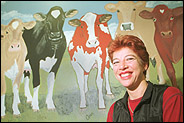Kaleidoscope
Nancy Lavigne: The force behind the farm
 PHOTO: Owen Egan
PHOTO: Owen Egan |
|
It's been a while since Nancy Lavigne was coordinator of special events at Macdonald Campus, but it's clear that in her capacity as the farm's administrator, she still exercises her knack for making special events occur.
Take today, for instance. As she leads me into the barn to watch the 80 cows being milked -- six at a time, that is -- lo and behold if one of them isn't in the throes of giving birth. It's a male calf. A farm staffer grunts his disappointment.
When it comes to cattle, the farm specializes in milk production, a task this wobbly little fellow is unequipped for. He'll be sold once he's had a chance to adjust to his new world.
Every second day, says Lavigne with pride, the Quebec dairy Agropur takes 5,000 litres of milk from Mac and leaves $2,500. Aside from milk, Lavigne oversees the sale of pigs, male calves, beef cattle, chickens and eggs to off-campus buyers in her capacity as the accountant for everything that comes from and goes to the farm.
Separated (except for the poultry building) from the main part of the Macdonald Campus by the highway 20 viaduct, the farm includes the swine, poultry, dairy and field (where animal feed is grown) units.
The farm is also a popular site for educational tours and a summertime petting zoo -- a favourite destination for school and day camp visits.
Among the items Lavigne buys for the campus are feed, medication, the occasional new cow or pig and accessories such as udder bras.
Udder bras? you ask. So did Lavigne, as she was first getting used to the farm's vocabulary six years ago when she began the job.
"That's for a cow whose ligaments are damaged, causing the udder to drop," she explains, continuing with another udder story, this one to do with a caller wondering if Nancy could sell her some udder balm, hailed by country singer Shania Twain for its capacity to remove under-eye bags.
"You get all kinds of strange requests here," she says, blue eyes shining with amusement.
It's the variety and the unpredictable nature of the job that Lavigne loves. "With animals, you have to take action right away and be prepared to change your priorities fast," she notes.
While Lavigne didn't grow up on a farm, her father, an insurance salesman, always had a few farm animals where she grew up in Senneville, the third of four children. And she's clearly fond of their presence. When the "go, go, go" pace of the farm gets to her, she simply steps out of her office.
"Here, if you need a few minutes' break from your work, you just go outside and pet a calf."
If the care of animals often requires immediate action, the care of humans, especially in the young adult category, can be equally demanding. Lavigne is in charge of paying the 25 students working part-time and full-time at various periods of the year, either as barn hands or tour leaders during the summer months. She also oversees the many students who do volunteer field placements at the farm. It's an aspect of her job that she loves but, on occasion, it does tie up an evening or weekend.
A few years ago, on the look-out for a low-cost way of having extra hands on the farm while providing a valuable experience to young people, Lavigne hit upon Katimavik, the federal program that sends groups of rural and urban young Canadians to work on community projects.
Her supervisor at the time, agricultural economics professor Laurie Baker, was impressed by Lavigne's generosity and resourcefulness, especially when the Katimavik group's rented house burned down.
Not only did Lavigne take four of the 12 Katimavik participants into the home she shares with her husband and two young children, "Nancy took it upon herself to organize a clothing drive and help the kids replace their belongings. Those young people left with a very good feeling about Katimavik, Macdonald and McGill."
One of them, Sébastien Brière, decided to study at Mac and now works in the dairy barn.
Baker commends Lavigne for her "unbounded enthusiasm" and degree of participation in the farm, Mac and Ste. Anne de Bellevue. For the town's Christmas parade, for instance, he recounts, "she got the farm's float organized, borrowing farm equipment and organizing people to make costumes."
As for Lavigne: "I really get into all of this," she says of a job that requires organizational moxie as well as a willingness to get down and dirty in pursuit of the occasional rabbit making a daring escape from the petting zoo.
 |
||||
|
What we would hope in the ideal world would be to convince them that their opinion is, in fact, discriminatory. We would like it if there were no possible expert witnesses to testify for the government against same-sex marriage, period. |
||||
Caustic cargo
 PHOTO: Owen Egan
PHOTO: Owen Egan |
|
Rude and crude, it isn't for everyone's tastes, but Trucker magazine is gaining a loyal following among young urbanites in Montreal and Toronto.
Described by co-founder Chris Michael as a "twisted lifestyle magazine for people my age [in their 20s]," an official launch party for Trucker in Toronto recently drew about 1,500 and the Toronto Star published a complimentary piece about the publication last week.
Trucker started off as "a crappy little newsletter" put together by Michael, a McGill sociology student, to poke fun at the silliness rampant in an urban culture largely produced by the marketing departments of large corporations and cheerfully consumed by young adults savvy enough to know better.
It struck a chord. Friends signed up to help turn Trucker into a full-fledged magazine. Michael (pictured) earned a summer job at the National Post summarizing episodes of Survivor and used a chunk of his savings to bankroll Trucker. Restaurants, record stores and other businesses have agreed to stock the publication, now a bi-monthly with a circulation of 10,000.
"Our mandate is to sell out," explains Michael. "We embrace what we're told to love, but we go at it so hard, we reveal what a fraud [rampant consumerism] is."
The latest issue of Trucker features a column called "Ask a rich young American" ("They just don't get enough of a say," declares Michael),as well as a guide to some of the best writing to be found on the walls of public washrooms, and a listing of "the most extravagant crap you can buy" (one example culled from the Web: fingernails from serial killers).
Trucker can be found at various venues along Ste. Catherine and St. Laurent, but Michael hopes to distribute the publication closer to home; he is negotiating with the Students' Society of McGill University to have it distributed on campus.
 |
||||
|
They can argue that Margo is a flaming maniac, that she is or is not an expert, but what is premature is to say she shouldn't be allowed to get into the process to have her expertise tested, that she shouldn't even have the chance. |
||||
Taking shots at SSHRC
 Worthy of study?
Worthy of study? |
|
During the recent federal election campaign, Ted White, the Canadian Alliance MP for North Vancouver and a member of the Official Opposition's "shadow cabinet," was urged by a constituent, a university professor, to lobby the government for more funding for research in the social sciences and humanities.
"I made it clear that I would be lobbying the government to give less money," recalls White, a vocal critic of the research funded by the Social Sciences and Humanities Research Council.
SSHRC supporters protested. Despite the kerfuffle, White says his vote totals went up and he attributes that, in part, to the fact that his constituents agree with his criticisms of SSHRC.
"An average person looking at the list [of projects funded by SSHRC] would ask, 'Why on Earth are we funding these things?'" White questions the need to support such research projects as "Figure skating and the representation of gender and sexuality in sport." "It's almost impossible to find out the value of this kind of research."
He says SSHRC-funded researchers rarely discuss their work publicly the way their colleagues in science, engineering and medicine do. He promises to keep the issue alive in the months to come.
SSHRC public affairs chief Garth Williams sees things differently.
"Our people are committed to explaining their work to the public," insists Williams, adding that SSHRC-funded sociologists, political scientists, economists and other researchers are regularly quoted in major newspapers and on TV news shows, commenting on the issues of the day.
He says SSHRC's peer review process matches up well with more science-oriented funding agencies. "Experts in the different fields evaluate the track records of the researchers [seeking funding] and the quality of the proposals. It's rigorous and extremely competitive.

